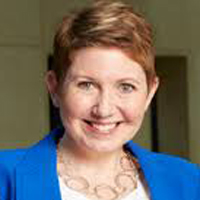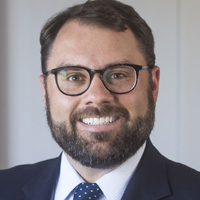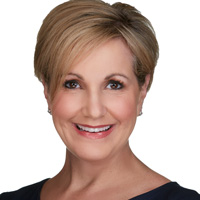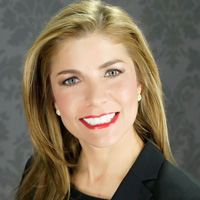
TVN’s Newsroom Innovators | As Elections Near, TV’s Fact-Checking Surges

Consumer trust in mainstream news was already wobbly well before the calendar flipped to 2020. But with the presidential election looming — and the White House occupant continuously working to discredit news organizations — it arguably became even more imperative that news groups find ways to generate greater consumer trust this year.
One way to do that is to lean on fact-checking like never before.

Sean McLaughlin
“We have a team of some of our best fact-checkers across our station group working together to fact-check information that comes out of the campaigns,” Sean McLaughlin, Scripps’ VP of news, local media, said in an email. “Anyone can respond to a convention or a press conference or follow the candidate on campaign trails — it really takes greater effort and doggedness to dig in, fact-check and hold people accountable. But it’s never been more important — for the industry, and for American democracy.”
Al Ortiz, VP of CBS News standards and practices, said by email he considers fact-checking part of any news organization’s “critical mission … to hold those in power accountable.” He says CBS News incorporates fact-checking into “everything we do on a daily basis,” and adds that the organization assigns “additional resources to special events such as convention speeches to assure our viewers get accurate information.”
As COVID-19 continued its assault on the U.S. in 2020, and then widespread racial injustice protests broke out, the need for news providers to deliver strictly airtight facts across all platforms was only reinforced. Lives were literally on the line.
To wit, during the first night of MSNBC’s Republican National Convention coverage, Rachel Maddow announced her team would fact-check, in real time, “potentially dangerous misinformation, especially of the medical variety.” She noted that MSNBC was broadcasting the convention “by choice,” but did not want to be a conduit for false information. The network brought in medical specialists to fact-check statements made during the convention.
Hearst’s Commitment 2020
Some station groups have gone even further, branding their more profound fact-checking efforts along the way to make them more apparent to viewers, particularly those speculative of news trustworthiness.
Hearst announced in October 2019 that, in the run-up to the election, the group would expand its coverage into each of the 50 states. It calls the initiative “Commitment 2020,” and it includes boosted fact-checking processes, rallied in partnership with FactCheck.org.
“Our D.C. bureau leads the effort — both in conjunction with FactCheck.org and across the group of stations contributing content,” said Barbara Maushard, SVP of news at Hearst, by email. “The bureau produces at minimum a weekly story highlighting important statements made and what is true, what is not, where there might be omissions, whether inadvertent or not; it’s often a daily element to coverage.”

Barbara Maushard
Hearst fact-checks claims made in political ads, speeches and debates in local, state and national races, Maushard says. The company’s digital teams regularly publish articles focused on fact-checking information as well.
“In a normal week, we probably publish one to two fact-check pieces related to statements made by officials or viral images and memes that might be circulating online,” Maushard notes. “During heavy political windows — for example during the conventions — we publish fact-checks daily. They cycle through either our politics landing page (the Commitment 2020 section of our sites) or our national news landing page.”
Poynter’s Politifact
Alongside organizations like FactCheck.org, Politifact, out of the Poynter Institute, has emerged as another trusted fact-checking team. Since launching in the run-up to the 2008 presidential election, Politifact has worked with several news publishers, but more recently has also licensed its content to broadcast news teams, including Telemundo, Spectrum News and Scripps.

Aaron Sharockman
Aaron Sharockman, executive director of Politifact, says that fact-checking in 2020, at its core, is not necessarily more important than it was at any other point. But the challenges in delivering news today, with accuracy and timeliness, have perhaps been heightened.
“Since people could speak, and probably before that even, people told falsehoods, or told lies,” Sharockman says. “The concept of people saying things that are untrue is not new, but I think what we have today, and what I think most of us recognize, the velocity in which these false statements can travel is so much greater than anything we’ve seen before.”
In short: news people had better be on their toes, which is part of the reason why Tegna and Graham Media Group, two groups that have always prioritized fact-checking, coordinated fresh fact-checking training for their respective team members this year. The goal was to sharpen their staff’s skills in light of not only the election, but the rapid growth of misinformation spread across any number of digital platforms.
Tegna And Verify

Ellen Crooke
“As journalists we are all trained to seek the truth … but we at Tegna believe that in 2020 we also have an obligation to stop the spread of false information,” says Ellen Crooke, the group’s VP of news. “Local journalists are the most trusted journalists in America right now, and if not us, then who? We’ll be able to help clear things up and help explain the origin of false information that [viewers are] seeing, and even teach our consumers how they themselves can be better news consumers.”
Beginning in January, all of the Tegna group’s journalists took part in training to help them identify the ways false information spreads, and how to ethically and appropriately debunk such claims. They also learned how to identify doctored or fake videos and photographs.
Later, Crooke says Tegna arranged additional journalist training that revealed how certain groups — often minority communities — are targeted by misinformation campaigns. For both sessions, Tegna partnered with First Draft, and Crooke says the newsgroup will continue to call on First Draft for help with misinformation identification.
Tegna’s already popular Verify programming, which analyzes the truth of heavily circulated theories, beliefs and stories online, was also expanded across all the group’s station markets — apparently with welcome payoff.
“The growth of Verify, between COVID and the George Floyd protests and the elections, has been incredible,” Crooke says. “[It’s] up 77% in visitors; video plays are up 335%. One of our stations that does a lot of Verify [branded reports], their unique visitors are up 300%.”
Graham’s Trust Index

Fergus Bell
Graham, meanwhile, tapped Fergus Bell, founder of Fathm, a media consultancy agency that focuses on new technology and digital trends, to lead its team’s training on how to fight the disinformation spread.
“The misinformation tactics we saw in the 2016 election have evolved, so we need to ensure we’re constantly updating our strategies for dealing with this challenge,” Bell said by email. “Journalists at [Graham] stations now have even more robust and versatile verification and fact-checking processes that can just as easily deal with pandemics as with election coverage. To be able to engage with audiences on this issue at such a local level is really exciting.”
A result of the work with Bell was the implementation of a new, branded verification system dubbed the Trust Index.
Viewer inquiries trigger news stories, with Graham reporters working through the Trust Index protocols to produce stories. (Since its February launch, Dustin Block, Graham audience development lead, says the group has fielded more than 400 tips from consumers.) Local reporters also generate their own stories of disinformation debunking, and after sharing through the company, sometimes prompt sister stations to put their own market spin on the piece.
In August, Graham’s KSAT San Antonio broadcast a Trust Index-branded report about “pink slime” local news sites, which are automated websites crafted to look like legitimate news organizations that have roughly tripled in number in 2020. KSAT’s reporting revealed that a company called Metric Media, based in Delaware, had constructed 56 websites that appear to cover news across the state of Texas. The pink slime exposé idea originated in the Detroit market, making its way south via the Graham Trust Index system.
“What’s come out of it has been some of the best journalism,” says Catherine Badalamente, VP and chief innovation officer at Graham, referencing the Bell training and the Trust Index. “That’s one of the things that makes me so proud.”
Mistakes may happen occasionally, but these collective efforts indicate how committed TV news groups are to distributing truth.

Catherine Badalamente
Badalamente says that when people charge news groups, even in a joking way, with purposefully spreading false information on a wide scale, “it instantaneously makes me furious.”
“If they only knew how serious these newsrooms take their job, and how serious we as an organization take what we do, in terms of serving our community,” Badalamente says. “We need to do a better job of combating it, and … take the power of our airwaves and reinforce why we’re not like everyone else,” particularly unverified sources across the internet.
Tegna’s Crooke offers similar sentiments. “We as journalists can’t throw up our hands,” she says. “We have to work with more transparency, more fact-checking, more responsibility every day.
“The best way to gain trust,” she adds, “is to be more trustworthy.”
Broadcasters, including CBS, E.W. Scripps, Hearst, Tegna and Graham Media, are bolstering their fact-checking operations as the 2020 election looms closer, partnering with outside groups like Politifact, FactCheck.org and First Draft… Click To TweetEditor’s Note: This is the latest of TVNewsCheck’s “Newsroom Innovators” profiles, a series showcasing people and news organizations evolving the shape and substance of video reporting. These profiles will examine the inception of their innovations, the tools they employ and how they’re reconciling experimental approaches to news storytelling within daily workflows. You can find the others here.

































Comments (0)